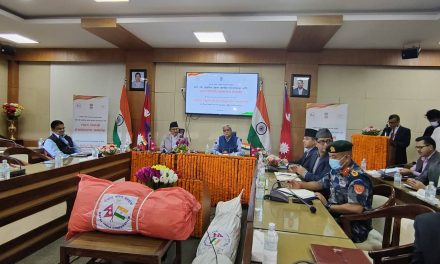Prime Minister K.P Oli along with his jumbo team of 119 members is currently in China for an official visit. This is essentially aimed at deepening the bilateral relations and cooperation between Nepal and China by signing different agreements and memorandum of understandings. In his exclusive talks with the Himalaya post, Hiranyalal Shrestha, a prominent foreign affairs expert, gives his opinions on the vital aspects of this visit. Excerpts
1. PM Oli ventured into his six-day official visit to China on June 20 accompanied by other ministers and high-level officials, among others. How do you assess this visit?
Nepal and China have long been enjoying warm, friendly and productive bilateral ties. In fact, both the neighbouring countries appear committed to streamline their mutual relations in line with the changing times.
At this moment, Nepal, in particular, is in need of sufficient investment in sectors related to infrastructure development, energy, tourism etc. Similarly, the northern border points of Nepal should be developed to facilitate its trade with China is also something urgent.
In this context, the current sojourn of PM Oli can be expected to be fruitful particularly in attracting the Chinese assistance in Nepal’s development endeavours.

2. Concretely speaking, what can Nepal expect from this visit?
Both the countries are signing a number of deals to further foster monetary and other technical cooperation between the two neighbouring countries. As such, there could well be China’s assistance for laying transmission lines, preparing detailed project report of the railway lines to be built from Kerung to Kathmandu, and reconstruction of ‘Nepal-China Friendship Bridges’ at Tatopani, Sindhupalchowk and Rasuwagadhi-Kerung. There also chances of adopting some financial measures to help mitigate the burgeoning trade deficit of Nepal with China.
3. In your view, what agenda/s the Nepali side must raise with utmost priority while holding discussions with the Chinese side?
First and foremost, Nepal, as a landlocked country, should make efforts to implement the transit trade treaty. Currently, the country’s foreign trade is excessively tilted towards India as the former has only one sea port in Kolkata located in the latter’s territory. Pertinently, the blatant economic blockades imposed by India on Nepal in the past have much to do with this fact.

In this context, the implementation of such treaty will provide Nepal access to Chinese sea port for third-country trade. In fact, it will go a long way in assisting Nepal to mitigate its chronic economic dependence on India by diversifying trade with other foreign countries. The Nepali side must focus on implementing the said deal under the framework of the Belt and Road Initiative (BRI), a mega development strategy proposed by the Chinese government for fostering connectivity and cooperation between the Eurasian countries.
Likewise, Nepal needs to make efforts to lay the cross-border transmission lines for the trading of electricity between the two countries. This will enable Nepal to export electricity to China in such a way, which could help reduce its huge trade deficit with China. Electricity trade with China is also crucially significant given the threats issued by India not to import the power generated in Nepal by any foreign companies other than the Indian ones.
4. Do you think the ongoing PM’s Oli’s visit to China will also address the contentious political issues related to the bordering areas like Kalapani and Lipulekh?
Now we have a strong government with two/thirds majority that is seeking to have a balanced relationship with both the neighbouring countries- China and India. So, I believe this is an opportune time for Nepal to resolve the territorial disputes regarding Kalapani and Lipulekh with these two countries.
On the other side, I believe that the Sino-Nepal Treaty of Peace and Friendship, 1960, should also be reviewed in order to adjust it to the changed geo-political realities of today. It would be simply better if PM Oli raised such political This issues in the course of his China visit.

5. It is clear that the various agreements reached between Nepal and China in the past have not yet been materialized. So, is there any room to be optimistic that the deals made during this visit will get implemented?
This is a question of profound importance. The development of various development projects in Nepal like Kulekhai- 3 hydropower has failed to kick off because of the failure to implement such agreements. In order to address this anomaly, both the Nepali and Chinese sides need to be serious and show required diplomatic acumen. Developing a joint mechanism between them for implementing their bilateral deals is the need of the hour. The Nepali delegation will do well to take initiation to create such mechanism with China during its current China trip.

There have been talks about the possible visit of Chinese President Xi Jingpin in Nepal over the last 2 years. Nepali people are simply eager to see such visit as it can open up whole new vistas of opportunities for further enhancing the ties between the two countries. However, this is yet to take place largely due to the failure of Nepal to do adequate homework.
In fact, the litmus test of PM Oli’s China rests on his political acumen to work for the best national interests of Nepali by realizing the much awaited Nepal visit of the Chinese president at the soonest.






